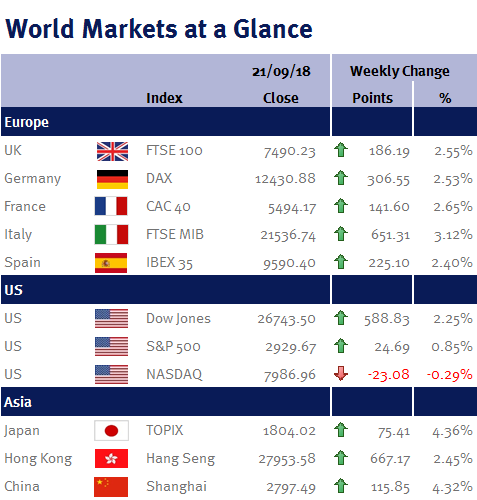Japan’s Prime Minister (Shinzo Abe) secured another three year term as leader of Japan’s Liberal Democratic Party this week after winning 553 out of a possible 810 votes. With lower house elections not due until 2021, his margin of victory should give him the confidence to continue his economic stimulus program. Today (Friday 21st September) Japan’s headline inflation for August was reported at 1.3%, coming in above expectations of 1.1%, lifted by fresh food and energy. Core inflation, which strips out these more volatile measures, was in line with expectations at 0.9% and earlier in the week, the Bank of Japan maintained their hugely supportive monetary policy and reaffirmed their 2% inflation target.
In Europe, manufacturing PMI came in below expectations and at 53.3 it was the lowest reading in two years. According to the survey, the auto industry (which has been targeted by the US) is taking the brunt of the slowdown, that is despite data earlier in the week showing a record 31.2% increase in new car registrations in August, although, this was likely an anomaly due to a new EU fuel consumption and emissions test applying to all new EU car registrations from September 2018.
Finally in the UK, Sterling had a roller coaster week; inflation data on Wednesday caused some volatility as CPI at 2.7% was above expectations. Whilst this is towards the upper end of the Bank of England’s target, the gains came from more volatile categories and so this reading alone is unlikely to influence the Bank’s future monetary policy decisions. Retail sales data for August helped lift the currency on Thursday; after a strong July, expectations were for a 0.2% fall in August but continued warm weather bolstered sales of household goods and led to a gain of 0.3% over the month. However, the Pound’s elevation was short lived as it emerged late on Thursday that the EU had rejected the UK’s BREXIT proposals and warned that time is running out for striking a deal. Then today (Friday 21st September) Theresa May’s statement caused a sharp fall in Sterling as she said she is unwilling to move any further and is ready to leave the EU without a deal.
BREXIT will continue to feature in the week ahead as Sunday sees the start of the UK Labour Party conference and later in the week, the 27 members of the EU (ex the UK) will meet for discussions. Next Wednesday the Fed is expected to raise US interest rates and Shinzo Abe will meet with Donald Trump to discuss trade. Data out next week includes US and UK GDP, European inflation, US PCE and Chinese Caixin PMI.
Peter Quayle, Fund Manager


